News
Sea Empress: Exactly 27 years since Wales’ worst ecological disaster
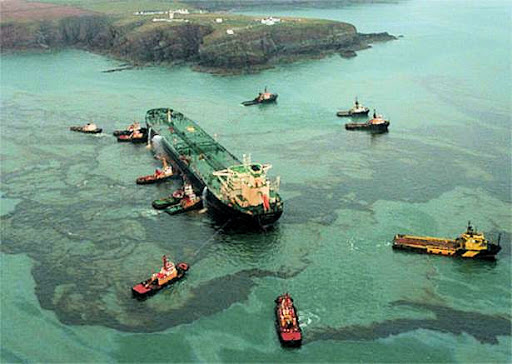
IT’S EXACTLY 27 years since Wales’ worst ecological disaster – single hull oil tanker hit rocks in the middle of the channel, holing her below the waterline.
On 15 February 1996, the Sea Empress oil tanker ran aground as it entered the Milford Haven Waterway.
Six days later, the tanker re-floated and was towed into the harbour. In the days between its grounding and towing, the oil tanker spilled 72,000 tons of crude oil along the Pembrokeshire Coastline, within the Pembrokeshire Coast National Park.
It was a Thursday morning the oil tanker was en route to the Texaco oil refinery when she became grounded on mid-channel rocks at St. Ann’s Head. Over the course of a week, she spilt 72,000 tons of crude oil into the sea. The spill occurred within the Pembrokeshire Coast National Park – one of Europe’s most important and sensitive wildlife and marine conservation areas.
Sailing against the outgoing tide and in calm conditions, at 20:07 GMT the ship was pushed off course by the current and became grounded after hitting rocks in the middle of the channel.
The collision punctured her starboard hull causing oil to pour out into the sea. Tugs from Milford Haven Port Authority were sent to the scene and attempted to pull the vessel free and re-float her. During the initial rescue attempts, she detached several times from the tugs and grounded repeatedly – each time slicing open new sections of her hull and releasing more oil.
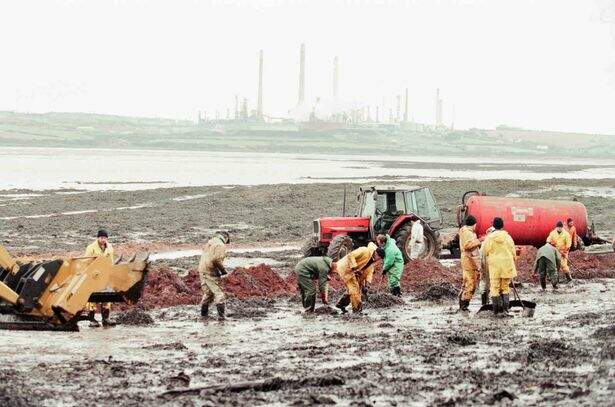
Clean up underway near Dale, Pembrokeshire following the oil spill (Image PA)
RESCUE OPERATION
A full scale emergency plan was activated by the authorities. News of the grounding was first reported at 21:18 on the BBC’s Nine O’Clock News – just over an hour after she ran aground.
Over the next few days, efforts to pull the vessel from the rocks continued.
Assisting the many local vessels, tugboats were drafted in from the ports of Dublin, Liverpool and Plymouth to assist with the salvage operation.
The tanker ran aground very close to the islands of Skomer and Skokholm – both national nature reserves, Sites of Special Scientific Interest (SSSI) and Special Protection Areas and home to Manx shearwaters, Atlantic puffins, guillemots, razorbills, great cormorants, kittiwakes, European storm-petrels, common shags and Eurasian oystercatchers.
Birds at sea were hit hard during the early weeks of the spill, resulting in thousands of deaths. The Pembrokeshire grey seal population didn’t appear to be affected too much and impacts to subtidal wildlife were limited. However, much damage was caused to shorelines affected by bulk oil. Shore seaweeds and invertebrates were killed in large quantities. Mass strandings of cockles and other shellfish occurred on sandy beaches. Rock pool fish were also affected. However, a range of tough shore species were seen to survive exposure to bulk oil and lingering residues.
A rescue centre for oiled birds was set up in Milford Haven. According to the Countryside Council for Wales (CCW), over 70% of released guillemots died within 14 days. Just 3% survived two months and only 1% survived a year.
The Pembrokeshire coast is home to common porpoises and bottlenose dolphins.
The effects of the oil and chemical pollution on these species remains unknown. Significant numbers of both species were recorded in the waters off the Skomer Marine Nature Reserve during the spring and summer of 1996.
The main containment and dispersement of the oil slick at sea was completed within six weeks. However, the removal of oil on shore took over a year until the late spring of 1997. Small amounts of oil were still found beneath the sand on sheltered beaches and in rock pools in 1999 – three years after the spill.
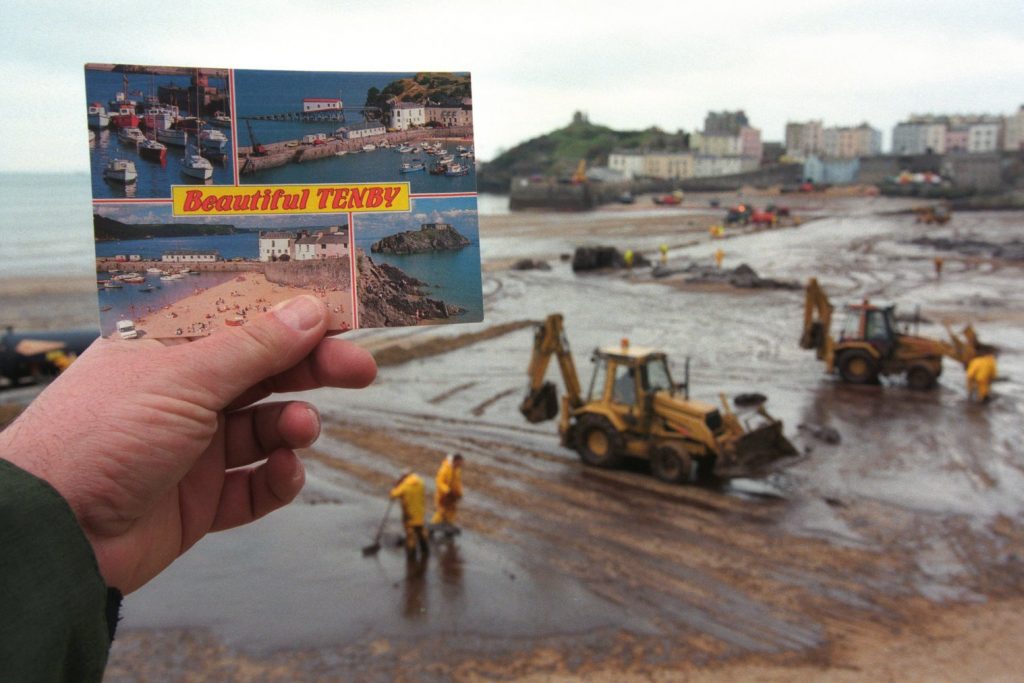
Contractors clean oil from Tenby north beach after the oil tanker Sea Empress ran aground on rocks Pembrokeshire Wales UK (Image: PA)
IT COULD HAVE BEEN WORSE
The effects of the spill were not as bad as initially predicted. This was due in part to the time of year when the spill occurred.
In February, many migratory animals had not yet arrived back in Pembrokeshire for breeding.
Along with stormy weather which helped break-up and naturally disperse the oil, the effect on wildlife would have been much worse if the spill had occurred just a month later.
The spill would undoubtedly have been catastrophic for both the environment and local economy if it had occurred during the summer months.
Much of the Pembrokeshire coastline recovered relatively quickly.
By 2001, the affected marine wildlife population levels had more-or-less returned to normal.
There was an immediate ban on fishing off the coast of Pembrokeshire and south Carmarthenshire which had a devastating impact on the local fishing industry.
The ban remained in place for several months and was lifted in stages.
Many local fishermen received financial compensation for the loss of income due to the ban.
The spill occurred just a few weeks before the Easter break when many holidaymakers would be visiting the area.
Some sheltered beaches and tidal estuaries were still covered with oil, but the main tourist locations of Tenby, Saundersfoot, Pendine, Manorbier and Bosherston were superficially cleaned.
A large clean-up operation began as soon as the Sea Empress started spilling oil.
Volunteers and paid hands alike, came together to restore the beautiful beaches of Pembrokeshire.
In the immediate days and weeks that followed, one thousand people worked around the clock to rescue oiled birds and remove oil from beaches using suction tankers, pressure washers and oil-absorbing scrubbers.
The main clean-up operation lasted several weeks and continued on a reduced scale for over a year.
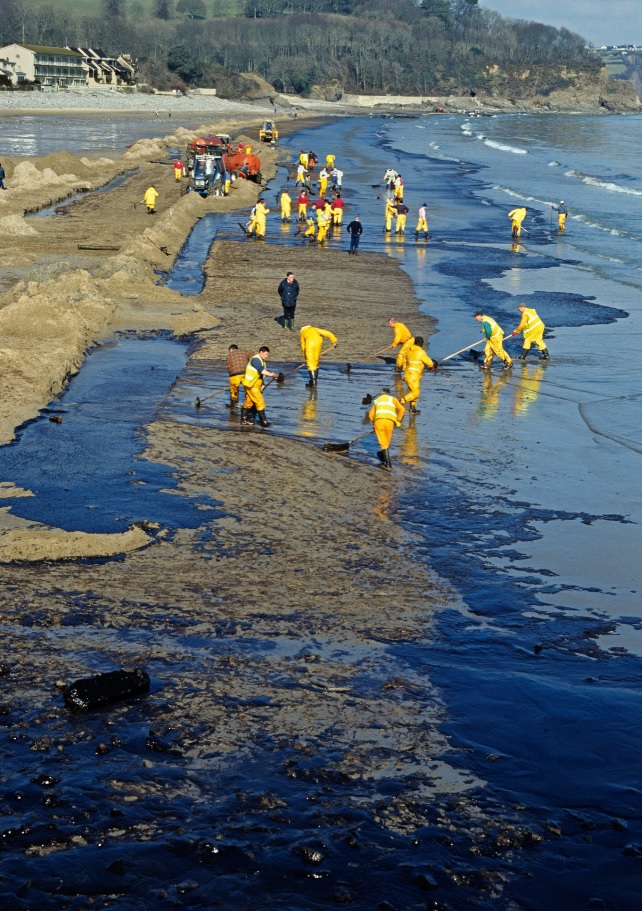
Workmen clean up the spill in Tenby (Image PA)
PORT AUTHORITY FINED £4 MILLION
Almost three years after the spill in January 1999, Milford Haven Port Authority (MHPA) was fined a record £4m after pleading guilty to the offence of causing pollution under the Water Resources Act 1991. The MHPA was also required to pay a further £825,000 prosecution costs by agreement.
The cost of the clean-up operation was estimated to be £60m. When the effects to the economy and environment are taken into account, the final cost is estimated to have been twice that, at £120m.
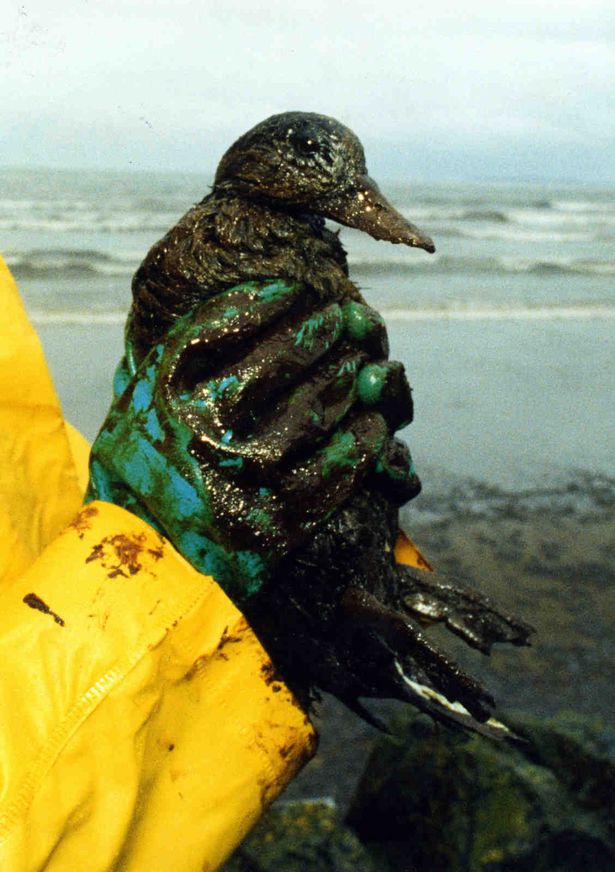
Oiled seabird rescued for cleaning (Image: File)
SHIPS BAD LUCK CONTINUES
While the cause of the initial grounding was found to be due to pilot error, it seems the vessel, even under new ownership, could not escape her run of bad luck. While attempting to dock for scrapping in Bangladesh she was ruptured again, this time by a sunken vessel.
She was renamed a further four times before her final demise, known as MV Front Spirit for a while before being sold under the name MV Ocean Opal, to Chinese buyers.
They used her as a floating storage and offloading unit from 2004. In 2010, she was converted in Shanghai into a bulk carrier, and re-flagged as the Panamanian registered MV Welwind. In 2012, she was renamed for a fifth time: MV Wind 3 and on June 3 that year the 274-metre long vessel was brought to Chittagong in Bangladesh for dismantling at the Shitakunda ship breaking yard.
On the way to the yard the ship developed a crack in one side of its engine room following a collision with a sunken ship, Hang Ro Bong, when she was attempting to anchor at the B (Bravo) anchorage of the port.
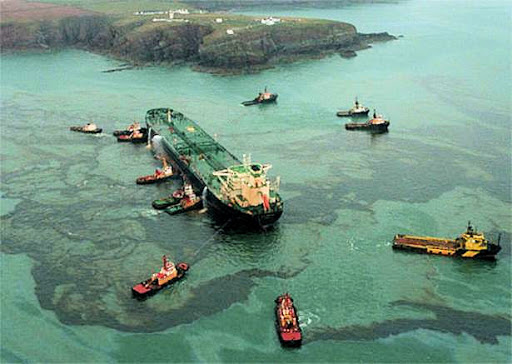
The view from above: The scale of the operation unfolds (Image: Herald archive/MCA)
LESSONS NOT LEARNED
In 2016 former local MP Nick Ainger said that the lessons from the disaster had not been learned
He told BBC Radio Wales’ Sunday Supplement programme that the scrapping of the UK’s emergency towing vessel fleet showed lessons had not been learned 20 years on- The Maritime and Coastguard Agency (MCA) said it was felt the shipping industry should fund such a service.
Mr Ainger said: “We now have a position, 20 years after the Sea Empress, 23 after the Braer, where we have no emergency towing vehicles stationed around our coast.
“Ironically, other countries in Europe, in Spain, in France, Germany, Norway have got government-financed emergency towing vessels.
“We, with our huge coastline with all the shipping that we have coming not only in and out of Milford Haven, but around our shores from the North Sea carrying crude oil, we haven’t got a government-supported emergency towing vessel.
“I think that lesson should be re-learned very, very quickly before we have another disaster.”
An MCA spokeswoman said: “The government believes that responsibility for ensuring the operational safety of ships is properly a matter for the commercial shipping industry, working in partnership with the tug and salvage industries; it did not believe that it was appropriate for the taxpayer to fund this provision.”
She added that no vessel had run aground or foundered in UK waters, nor had any pollution occurred, as a result of a ship being unable to engage a suitable towing vessel.
Following the Sea Empress disaster towing regulations in the Milford Haven waterway were tightened. Following the lead from a Scottish oil terminal, Sullom Voe, ‘escort towing’ was started. Cory Towage sent a representative to Shetland to observe and report back.
At the time the Sea Empress went aground this practice had already started in the Solent for the Port of Southampton, If Milford Haven had done the same in time, the disaster would certainly not have occurred.
Further reading: The Sea Empress’s second accident
Community
Public reminded to stay away from Ward’s Yard and Criterion Quay

THE PORT of Milford Haven is reminding members of the public to stay away from Ward’s Yard in Milford Haven and Criterion Quay (sometimes known as the offshore jetty) in Pembroke Dock due to concerns over public safety.
Despite significant security measures, people continue to access the sites illegally, ignoring and sometimes damaging the onsite signage and fences.
Niall Yeomans, Head of Health, Safety and Security at the Port of Milford Haven said: “Safety is our key priority. Members of the public are continuously putting themselves and members of our team at risk of serious harm by trespassing in these areas.”
“Both Ward’s Yard and Criterion Quay are unsafe for public access. They are isolated areas next to deep water and are susceptible to slips, trips and falls.”
Both sites are owned by the Port of Milford Haven and are private property. Anyone found onsite without consent is trespassing, and any criminal damage could result in prosecution.
Anyone who sees any suspicious activity at Ward’s Yard or Criterion Quay is asked to contact Dyfed Powys Police on 101 urgently.
Crime
‘Sophisticated’ organised crime gang trafficked cocaine and cannabis to Aberystwyth

FIVE people have been found guilty or admitted to conspiring to supply cocaine and cannabis as Dyfed-Powys Police continues its efforts to dismantle organised crime gangs.
Officers seized cocaine with a street value of more than £400,000 from gang members, who continually changed tactics to avoid arrest.
Six defendants have appeared in court in the latest phase of Dyfed-Powys Police’s Operation Burleigh, which sought to disrupt the trafficking and onward supply of class A and B drugs into Aberystwyth, with all but one admitting their charges or being found guilty by a jury.
This brings the total number of people awaiting sentence under the operation to 15.
The court heard that officers from Dyfed-Powys Police’s Serious and Organised Crime Team and Ceredigion Priority Policing Team led the investigation into the OCG, which was described as ‘sophisticated, well-organised and evolving’.
Detective Sergeant Steven Jones said: “This conspiracy operated on a County Lines model, where controlled drugs are trafficked into a smaller rural town from a larger city, and the operation is controlled by one or more ‘drugs lines’.
“In this case there were a total of four lines controlling the supply of cocaine and cannabis within Aberystwyth.
“The conspirators frequently evolved their actions to frustrate the authorities and evade capture.”
The OCG embedded members were mainly asylum seekers brought to Aberystwyth by Toana Ahmad and another man who remains outstanding, with the sole purpose of dealing drugs. The drug lines were initially based in Swansea, and later in areas of Birmingham.
Three properties – on Terrace Road, Alexander Road and Parc Graig Glas – were identified early in the investigation as being used to house the OCG members embedded in Aberystwyth. Substantial amounts of cash, controlled drugs and weapons were recovered from these properties, and from the people found inside.
When arrests were made, the gang changed its tactics. Drugs began to be supplied from vehicles, and OCG members stayed in guest houses to avoid detection.
DS Jones added: “Trusted couriers were employed to transport drugs to Aberystwyth and cash back to Birmingham or Swansea. A number of vehicles, including taxis, were used as the gang attempted to avoid detection along the route, while trains were also taken when courier cars were stopped by officers.”
In June 2023, two vehicles travelling from the West Midlands towards Aberystwyth were stopped by police on consecutive days. A black sock was uncovered in the engine of the first car, which was found to contain 82g of high purity cocaine divided into 169 grip seal plastic bags.
Davinder Singh, who previously pleaded guilty to conspiracy to supply class A and class B drugs, was the driver of the second vehicle, which was a taxi. A blue plastic bag was seen falling out of his shorts, which contained over 81g of high purity cocaine divided into 167 grip seal bags.
DS Jones said: “On the basis that the amounts of cocaine transported over the 37 couriers over the course of the conspiracy period were similar, over 3kg of cocaine would have been conveyed to Aberystwyth from Birmingham.
“This equates to class A drugs with a potential street value of over £308,950. In addition to this, class A drugs were seized from individuals and addresses with a potential street value of £103,445, along with cash totalling £11,687.
“A number of teams and departments across Dyfed-Powys Police, from analysts, CCTV operators and priority policing teams, to CAB, the Technical Support Unit, Economic Crime Team and Force Intelligence Bureau all assisted in dismantling the OCG from top to bottom.
“Their dedication and relentless efforts have assisted in making Aberystwyth a safer place to live without the threat and harm of drugs being made easily available on the street.”
After a seven-week trial at Swansea Crown Court earlier this year, the following three defendants were found guilty for their parts in the conspiracy:
- Toana Ahmad, aged 33, of Lee Gardens in Smethwich, West Midlands
- Barzan Sarhan, aged 31, of no fixed address
- Ahmed Piro, aged 26, of no fixed address
The jury failed to reach a verdict on two defendants during the earlier trial. They have been subject to a retrial starting on July 1, with the following outcomes:
- Hawre Ahmed, aged 35, of Pinderfields Road, Wakefield, West Yorkshire, was found guilty by the jury of conspiracy to supply Class A and B controlled drugs.
- Diar Yousef Zeabari, aged 35, of Flat 5, 41 Bryn Road, Swansea, was found not guilty of conspiracy to supply Class A and B controlled drugs.
Karwan Karim, aged 39 of 125 Griffith John Street, Swansea, also stood trial, and pleaded guilty to conspiracy to supply Class A and B controlled drugs on day three.
In addition to the OCG members found guilty during the most recent trials, the following have previously pleaded guilty to charges of conspiracy to supply class A and class B drugs under Operation Burleigh:
- Davinder Singh, aged 36, of Huntingdon Road, West Bromwich
- Daban Khalil, aged 23, of Streetly Road, Birmingham
- Kastro Omar, aged 30, of Junction Road, Northampton
- Karwan Jabari, aged 26, of Weedon Close, Northampton
- Walid Younis Abdal, aged 34, of St Anne’s Road, Doncaster
- Saman Aziz, aged 41, of Kirk Road, Merseyside
- Adel Mustafa, aged 39, of Hubert Road, Newport
- Charlotte Roberts, aged 21, of Sutton Hill, Telford
The following have previously pleaded guilty to conspiracy to supply class A drugs:
- Akasha Smith, aged 24, of Third Avenue, Aberystwyth
- Luqman Jarjis, aged 21, of Wake Green Road, Birmingham
News
Community asked for views on allocation of new St Davids homes

THE FIRST phase of Pembrokeshire County Council’s Glasfryn housing development in St Davids is progressing well with the second phase also underway.
The development being built by GRD Homes Ltd, began in November 2023, with a first phase completion date of Winter 2024 looking hopeful, ahead of the scheduled plans.
The first phase consists of seven properties, including a mixture of one and two bedroom bungalows
As completion draws closer the properties will be advertised via Pembrokeshire Choice Homes.
Ahead of this, the Council’s housing team will be holding community engagement on the 13th August 2024 at the Ty’r Pererin Centres, Quickwell Hill, St Davids, SA62 6PD, 5pm-7pm.
This will be a chance for officers to liaise with the local community about the allocation process for these properties.
Glasfryn’s second phase is well underway, with the initial groundwork already completed. This phase includes a further 11 two bedroom bungalows, with a completion date in late 2025.
These bungalows will meet the latest Welsh Government’s Development Quality Requirement, and will be energy efficient, built to EPC A specification and include solar panels to help tenants with running costs.
The Glasfryn development is funded in partnership with Welsh Government.
Cabinet Member for Housing Cllr Michelle Bateman said: “We are really keen to work with the community on a local lettings policy for these new properties, as we have done for our developments in other parts of the County.”
If you have any queries please email the Customer Liaison Team on [email protected], phone them on 01437 764551, or visit Housing’s Facebook page.
-

 Education5 days ago
Education5 days agoMilford Tesco worker achieves Oxford dream and lands top legal job
-

 Crime4 days ago
Crime4 days agoHaverfordwest man admits having nearly 1000 child and animal images
-

 Crime4 days ago
Crime4 days agoYouth set to appear in court over serious sexual offences
-

 Crime4 days ago
Crime4 days agoPolice investigating after man injured during altercation in cemetery
-

 Education4 days ago
Education4 days agoPupils delight in ice cream treat from Pembrokeshire’s number one van
-

 Crime4 days ago
Crime4 days agoTown centre ‘stinking of skunk’ as police strip cannabis farm
-

 Crime3 days ago
Crime3 days agoFag-butt police court summonses spark debate in Pembrokeshire
-

 News6 days ago
News6 days agoProposal to give firefighters a council tax discount to go to Cabinet































